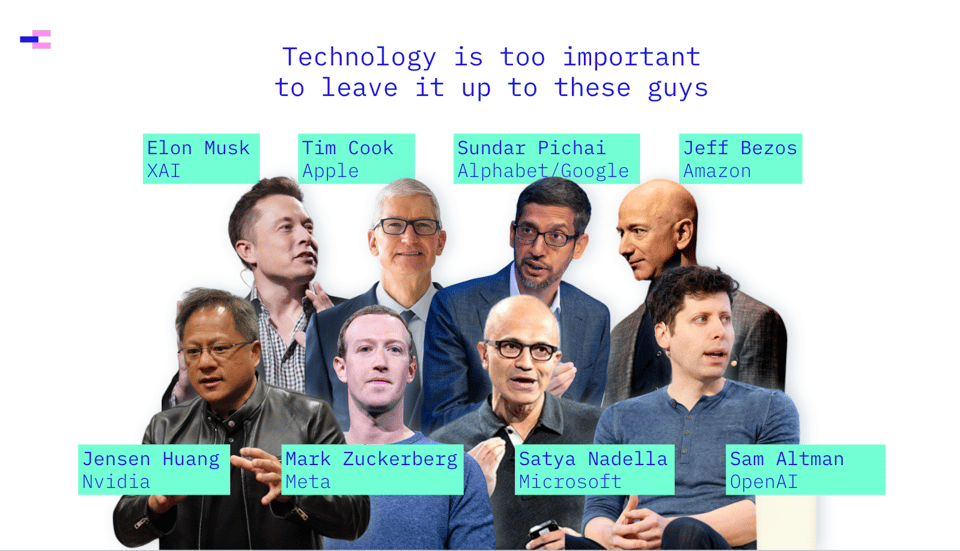Let's make technology work for 8 billion people not 8 billionaires
The case for progressive tech policy in the UK
👋 Hi, hello, it’s been nearly 5 months since I last wrote a newsletter so if you’re actually reading this rather than deleting it while thinking, “who is this woman?” - thanks very much, it’s nice to see you too. This one is about not being humble in the face of Big Tech, and having the courage to build alternatives.
Oh! and come and hang out on Bluesky. It’s good, like early Twitter and there’s lots of great starter packs to find excellent people, like this Public Interest Tech one by Meredith Broussard and this Critical AI one by Eryk Salvaggio.
Rachel Coldicutt
It seems to me that making technology work for 8 billion people rather than 8 billionaires is a fairly value-neutral goal.
Other than the billionaires in question – who are indisputably in the minority – I can’t think of many people this doesn’t work for. Stronger democracies; an end to extraction and surveillance; a commitment to planetary health and better labour practices; the ability to seek justice and redress; curbs on wealth hoarding so there’s more investment that benefits everyone. Of course, these aren’t value-neutral things – in the current political environment they are so left-wing so as to come back as cranky and then some – but I can’t think of any really good arguments for putting the needs of Bezos and co ahead of everyone else, so I’m going to keep churning out that line till someone actually proves me wrong.

And it has never been more important to keep restating and pushing for an equitable, progressive approach for technology.
A second Trump term is going to embolden the Big Tech firms, who already spend millions on lobbying and even more on marketing, to do whatever they like. There needs to be some balance – an equal and opposite movement that champions an inclusive, just innovation economy – because without it we’re set on an algorithmic road to fascism and then some.
It’s Big Tech’s World
This summer, not long after Labour won the election, I was lucky enough to collaborate with some other civil society organisations to bring together a hundred people – former regulators and civil servants, civil society leaders, academic researchers – to set out some priorities for progressive tech in the UK, many of which had been neglected by the Conservatives. I was a bit drunk on the possibilities of a Labour government at the time, and giddily wrote a letter to Peter Kyle, the new DSIT Secretary of State, co-signed by many attendees to put forward some policy ideas and offer help and support.
Several weeks later I received a boiler plate response explaining that this was not of interest.
Dealing with rejection is a core competency for everyone who works in public policy so I wasn’t particularly deterred, but it seemed surprising that there was no interest at all in engaging some of the experts who’d been propelled into the cold by the chill of the Tory culture wars. This seems significant given the Labour Party’s focus on message discipline and the landing of the Data (Adoption and Use) Bill on a gloomy Wednesday in the House of Lords; together these seem to send a message that alternative opinions are neither sought nor welcomed through the usual channels.
And while Lisa Nandy has warmly welcomed civil society into DCMS, Peter Kyle has taken the new economic focus of DSIT to heart and turned towards business to shape the brief – so much so that The Times has reported he has promoted the very biggest of the tech companies to nation status:
“I’m probably the first secretary of state that is dealing with companies which are outspending our entire British state when it comes to investment in innovation. So let’s just act with a bit of sense of humility. We are having to apply a sense of statecraft to working with companies that we’ve in the past reserved for dealing with other states.”
It’s fairly shocking Kyle said this out loud to a national newspaper.
If you’re an elected representative and your priority is protecting the ego of a few Big Tech firms then, surely, the time to mention your humility is over brandy at the end of dinner, as the extremely compelling head of public affairs passes you a cigar – not out loud to a national newspaper that will be read by those who used their precious right to vote to put you in office.
And you certainly don’t say it in the week that Elon Musk is crawling all over the next US government.

What is even more surprising is that Kyle didn’t really need to say this out loud.
Although Labour hasn’t published a tech strategy or an economic rationale for DSIT’s priorities, aspects of this pro-Big Tech approach have been well telegraphed. From the corporate roundtables at No. 11 to the PM declaring the UK should “run towards the opportunities of AI”, Politico reporting that the government is “moving forward in the direction” that Google wants to Kyle’s recent trip to Silicon Valley, the position is clear. This government is pro business! Pro growth! Pro investment! Pro data centres on grey belt land and several other things Microsoft lobbied hard for! In fact, the UK is a vessel waiting for all those lovely Big Tech dollars to be poured in.
Tactically, however, I would suggest that sharing our national humility in the national press will have the effect of making Kyle’s job harder in the long term, particularly with regard to online safety. It certainly won’t improve things for the CMA, Ofcom, or the assorted members of the DRCF and it also seems to neutralise the impact of the AI Safety Institute, which Kyle has proposed putting on a statutory footing, before it’s even really got going. Regulators can be many things, but humble is not one of them.
From a tech policy perspective, the Overton Window doesn’t seem to have shifted much since Michelle Donelan was Secretary of State. It is still hovering over tech boosterism, “AI Action”, and a penchant for putting an algorithm on it. And while there is other work happening in DSIT – including the digital centre of government programme and a renewed commitment to digital inclusion - the only real commitment to building better lives for people is a promise to reduce the number of hours we’ll spend logging into government websites. This is tech first, people later, and the UK cannot afford to keep heading in the direction that will take us.
Building a Progressive Tech Movement
I’ve written before about how there’s not much UK investment in progressive technology. While funders in both the US and Europe have formed coalitions to support activities ranging from public interest tech to legislative scrutiny, there is not the equivalent in the UK.
As some civil society bodies bootstrap their engagement with the next iteration of the Data Bill, there’s little to go round to shift the narrative, build a compelling movement with strong relationships and a clear media presence, and invest in the skills and infrastructures needed to create alternative technologies. There is some promising convening (h/t in particular to Labour Digital and to the Connected By Data civil society network) but there a few places to share and grow new ideas that could really gain traction; there’s no Works in Progress for progressives, no Entrepreneur First to incubate public interest infrastructure, and vanishingly little funding for what MySociety are calling “pro-democracy tech”. Progressive technology needs to get out of the margins and into the mainstream.
If technologies are going to help us shape our futures, more of us need to be a part of creating and steering them. A more diverse technology landscape will increase our democratic, economic and social resilience – and that’s far too important to leave up to a handful of billionaires. Let’s build it together.
—-
Gratuitous self-promotion!

💳 Buy a FOMO is not a strategy sticker
🍐Take part in a half-day unconference on AI policy and the Creative Industries (bookings close lunchtime today!)
📚 Read this essay by me and Matt Dowse on building an inclusive innovation economy